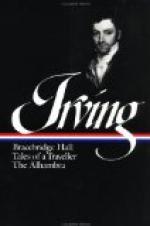“Ah, sir! but they have luck on their side; they are in the fashion— there’s nothing like being in fashion. A man that has once got his character up for a wit, is always sure of a laugh, say what he may. He may utter as much nonsense as he pleases, and all will pass current. No one stops to question the coin of a rich man; but a poor devil cannot pass off either a joke or a guinea, without its being examined on both sides. Wit and coin are always doubted with a threadbare coat.
“For my part,” continued he, giving his hat a twitch a little more on one side, “for my part, I hate your fine dinners; there’s nothing, sir, like the freedom of a chop-house. I’d rather, any time, have my steak and tankard among my own set, than drink claret and eat venison with your cursed civil, elegant company, who never laugh at a good joke from a poor devil, for fear of its being vulgar. A good joke grows in a wet soil; it flourishes in low places, but withers on your d—d high, dry grounds. I once kept high company, sir, until I nearly ruined myself; I grew so dull, and vapid, and genteel. Nothing saved me but being arrested by my landlady and thrown into prison; where a course of catch-clubs, eight-penny ale, and poor-devil company, manured my mind and brought it back to itself again.”
As it was now growing late we parted for the evening; though I felt anxious to know more of this practical philosopher. I was glad, therefore, when Buckthorne proposed to have another meeting to talk over old school times, and inquired his school-mate’s address. The latter seemed at first a little shy of naming his lodgings; but suddenly assuming an air of hardihood—“Green Arbour court, sir,” exclaimed he—“number—in Green Arbour court. You must know the place. Classic ground, sir! classic ground! It was there Goldsmith wrote his Vicar of Wakefield. I always like to live in literary haunts.”
I was amused with this whimsical apology for shabby quarters. On our Way homewards Buckthorne assured me that this Dribble had been the prime wit and great wag of the school in their boyish days, and one of those unlucky urchins denominated bright geniuses. As he perceived me curious respecting his old school-mate, he promised to take me with him, in his proposed visit to Green Arbour court.
A few mornings afterwards he called upon me, and we set forth on our expedition. He led me through a variety of singular alleys, and courts, and blind passages; for he appeared to be profoundly versed in all the intricate geography of the metropolis. At length we came out upon Fleet Market, and traversing it, turned up a narrow street to the bottom of a long steep flight of stone steps, named Break-neck Stairs. These, he told me, led up to Green Arbour court, and that down them poor Goldsmith might many a time have risked his neck. When we entered the court, I could not but smile to think in what out-of-the-way corners genius produces her bantlings! And the muses, those capricious dames, who, forsooth, so often refuse to visit palaces, and deny a single smile to votaries in splendid studies and gilded drawing-rooms,—what holes and burrows will they frequent to lavish their favors on some ragged disciple!




